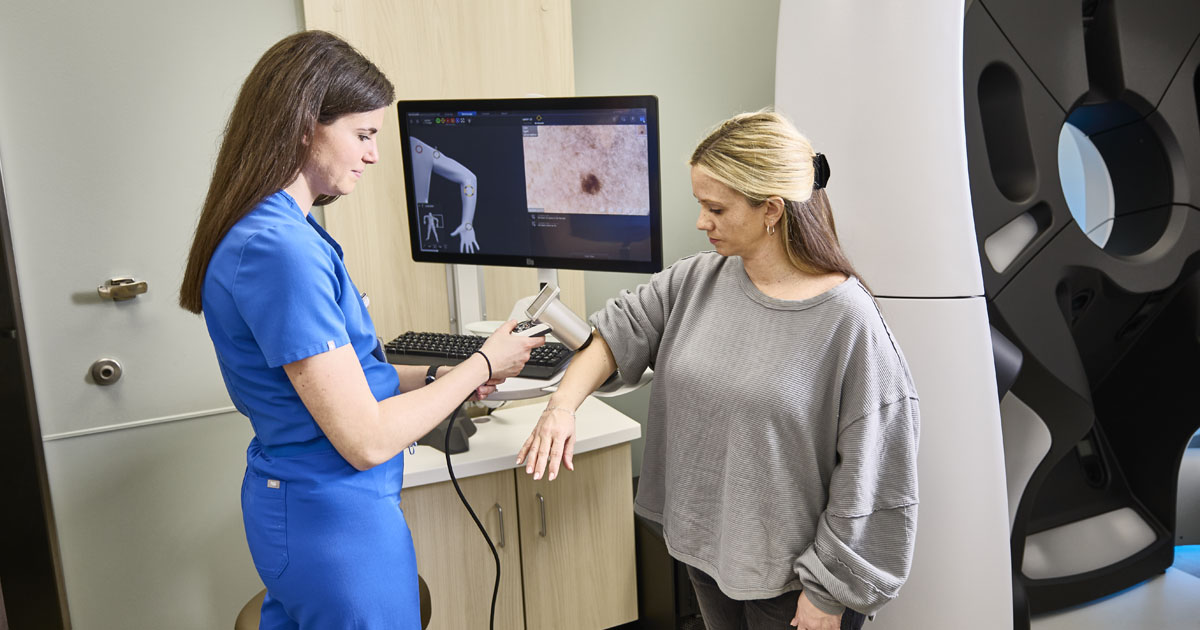Sun Safety: Protecting your Skin from Damage and Skin Cancer

Spending time outside is fun, but unsafe sun exposure can seriously harm your skin.
AHN Cancer Institute at West Penn Hospital has expert sun safety guidance to help you and your loved ones prevent skin cancer.
Skin cancer risks
To prevent skin cancer, it’s important to know your risk. You may be at higher skin cancer risk if you:
- Have fair skin or red hair
- Have had five or more blistering sunburns
- Use tobacco products
- Have used a tanning bed — even just once*
- Have had an organ transplant
- Take medicine that weakens your immune system
Types of skin cancer
The most dangerous type of skin cancer is melanoma. It often starts as a small mole and can spread quickly.
Melanoma occurs when skin is exposed to ultraviolet (UV) radiation from the sun or tanning beds. The cancer starts in the upper layer of the skin, in cells called melanocytes. The cells make melanin, which is what gives your skin its color.
“Melanoma is the most serious type of skin cancer, but it’s not the only one we watch closely,” said Charles Mount, MD, dermatologist and associate director of the AHN Cancer Institute Skin Cancer Center. “Other skin cancers are more common and can still cause long-term damage if left untreated. The key with any skin cancer is catching it early.”
Other types of skin cancer include:
- Basal cell carcinoma – Usually a painless, raised area on skin that has been exposed to the sun.
- Squamous cell carcinoma – Develops in the flat cells on the outer layer of the skin.
- Merkel cell carcinoma – A rare but aggressive cancer that looks like firm, red lumps on the skin.
Protecting your skin
Spending time in the sun exposes you to UV rays, which can lead to sunburn, premature aging, and cancer. UV rays are strongest between 10 a.m.–3 p.m. each day.
To protect your skin from harmful UV rays:
- Wear protective clothing, like swim shirts and hats.
- Use sunscreen consistently. Dermatologists recommend sunscreen with an SPF (sun protection factor) of at least 30 for daily use, and SPF 50+ when outdoors for prolonged periods such as at the pool, beach, or spending time in water.
- Reapply sunscreen every 2–3 hours.
If you do get sunburned:
- Use a sunburn treatment such as unscented moisturizer or cream with aloe, shea butter, or cocoa butter.
- Drink water and avoid alcohol to stay hydrated.
- Cover the burn with a clean bandage while it heals.
- Take an over-the-counter pain reliever to manage pain and inflammation.
- Take a cool shower or bath to relieve discomfort.
- Avoid picking at or popping any blisters on the burn.
Advanced dermatology services
Getting regular skin cancer screenings is crucial for staying on top of your skin health.
AHN Cancer Institute at West Penn Hospital offers skin exams, advanced screening technologies, and surgeries for patients with various skin concerns.
West Penn uses a tool called the VECTRA® WB360 to do fast, full-body skin scans.** The machine has more than 46 stereo camera pods that take 3D visuals of your skin within seconds, and an AI-type software that is able to detect potential skin cancer.
“Tools like the VECTRA® system make scans easier and more comfortable for our patients,” said Dr. Mount. “It helps us get a clear, complete picture of your skin, so we can keep track of changes and give you the peace of mind that nothing is being missed.”
Schedule a skin exam
No matter how much sun exposure you get throughout the year, getting your skin checked is a smart move. The dermatology team at AHN Cancer Institute at West Penn Hospital is here to help. Visit the Melanoma and Skin Cancer Center of Excellence page on AHN’s site to schedule a skin exam.
Source: 5 Myths of Indoor Tanning, Busted! Skincancer.org.
VECTRA® is a registered trademark of Canfield Scientific, Inc.
About Charles E. Mount, MD
Charles Edward Mount, MD, FAAD, is a dermatologist and Co-Director of the AHN Cancer Institute Skin Cancer Center. He is skilled at skin cancer, autoimmune skin disease, oncodermatology, and inpatient dermatology.
The nationally renowned, ultramodern Allegheny Health Network (AHN) Cancer Institute at West Penn Hospital offers leading-edge therapies for all types of cancer. Here, you have access to the latest surgical, medical, and radiation oncology treatments. We also offer proven therapies for blood cancers. We provide all diagnostic and treatment services in one convenient location that was designed with your comfort in mind.

